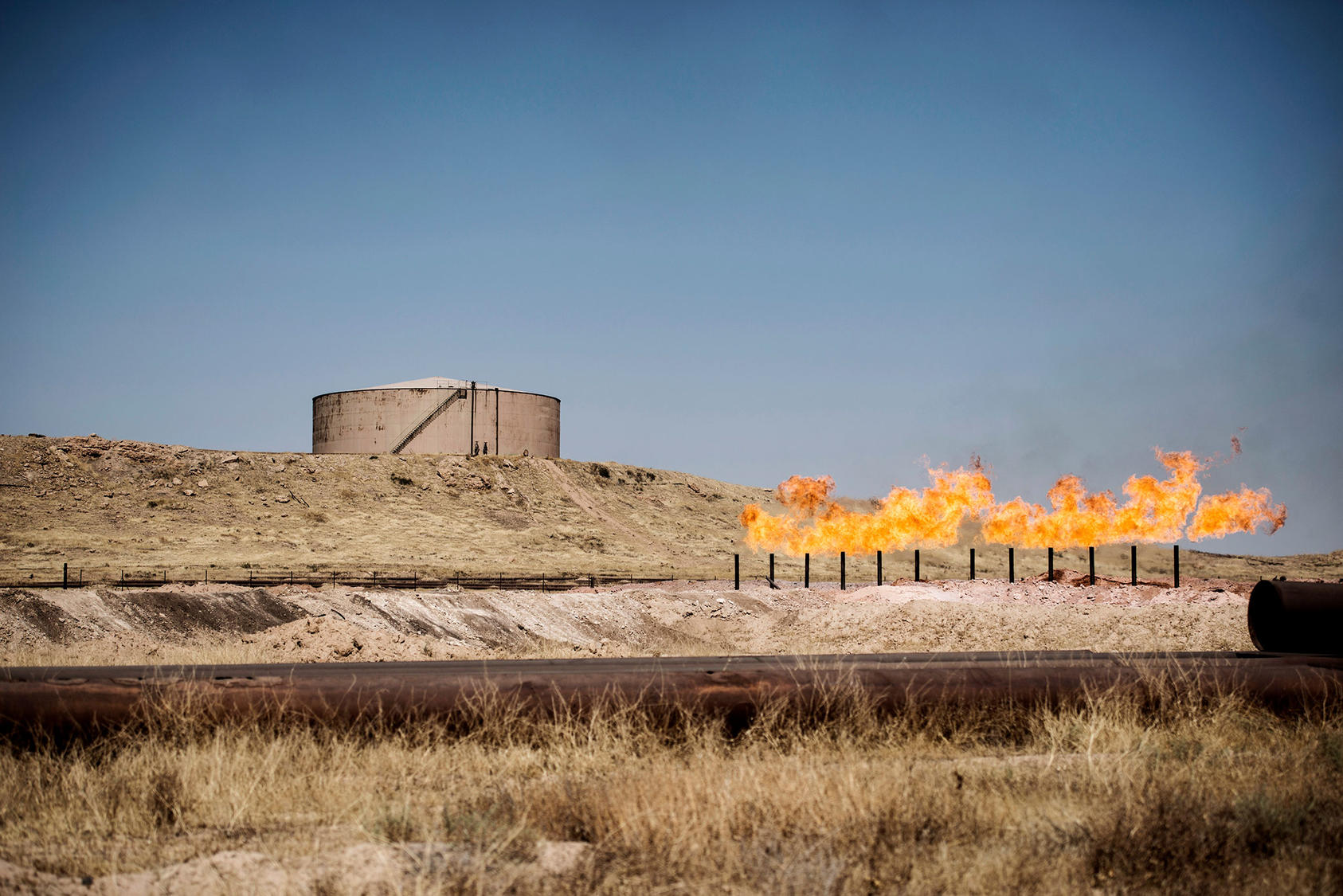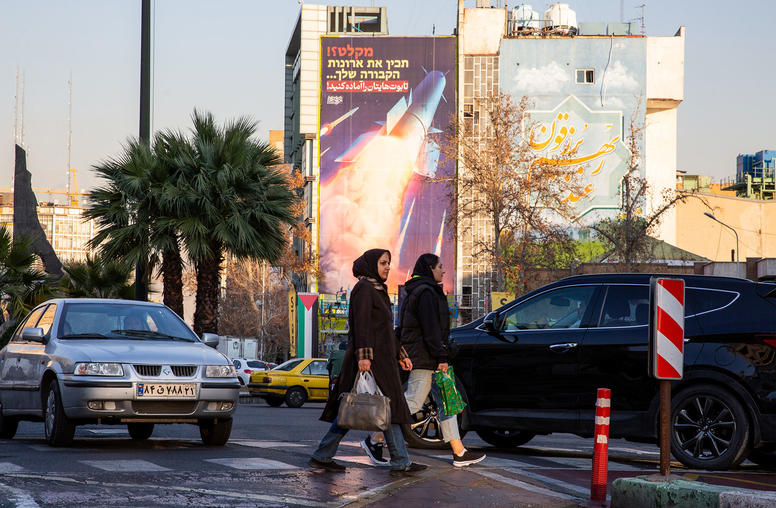Could Iraq’s Economy Suffer Collateral Damage from Iran Sanctions?
Expanded sanctions on gas and power could be a significant setback for Iraq at a politically delicate moment.
With Iraq and Iran sharing a 900-mile border and deep commercial ties, the renewal of U.S. sanctions against Tehran without doubt would be felt in Baghdad. To what degree the Iraqi economy could end up collateral damage of the sanctions, however, requires detailed analysis.

The bottom line, from a strictly economic standpoint, is that Iraq is likely to avoid serious harm unless the U.S. imposes more stringent measures than were in force before the U.S. and Iran signed the Joint Comprehensive Plan of Action (JCPOA) in 2015. Surprisingly, this is the case even though Iran in recent years has become the third largest source of imports for Iraq after Turkey and China.
Specifically, the U.S. would have to decide to sanction Iraq's estimated 12 million cubic meters a day of Iranian natural gas imports. The new sanctions would also have to sweep in electricity—and Iraq is already muddling along without Iranian power after a cutoff in July sparked by Baghdad's failure to pay its electricity bills. While such steps cannot be ruled out, they would likely create significant geo-strategic downsides with respect to both Iraq and Turkey and give U.S. policymakers pause.
The Oil Channel
The U.S. sanctions set to take effect on November 4 first and foremost target sales of Iranian oil, the country's leading export and the lynchpin of its economy. This means mainly crude oil, it but includes refined petroleum products as well.
On world oil markets Iraq is a competitor of Iran, not a customer, with the two ranking second and third among OPEC oil exporters. To the extent U.S. sanctions push global oil prices higher, Iraq will reap more revenue and may—to the limited degree it can—increase exports to replace Iranian supply.
Iraq does, however, import some refined petroleum products from Iran. Since the fighting with ISIS mostly destroyed the Bayji refinery in 2014, Iraq has increased imports of refined products to about 300,000 barrels a day, according to OPEC data. Although an accurate breakdown of sources is hard to come by, a portion of the refined imports reportedly either originates in Iranian refineries or transits through Iran.
Iraq could replace any Iranian imports from elsewhere. It might cost a bit more and the additional cost to consumers could add to ordinary Iraqis' considerable frustrations but paying for alternatives would hardly constitute a body blow to the Iraqi economy.
The Financial System
A more significant risk would arise from attempts by Iranians to circumvent financial sanctions through Iraq. The United States will not hesitate to sanction Iraqi banks, as it has done in the past (including one bank this year). Historically, the Iraqi authorities, including the Central Bank, which oversees the financial system, have assiduously avoided running afoul of U.S. sanctions on Iran. The same has largely held true for Iraq's commercial bankers, who are keen to retain access to the U.S. financial system, particularly clearing dollar-denominated international trade transactions in New York.
Rather than use an Iraqi bank for international wire transfers, Iranians seeking to evade U.S. sanctions would more likely take advantage of Iraq's still mostly cash-based economy. Iranian entities could purchase dollars from Iraqi businessmen or even Iraqi exchange houses in defiance of Iraqi regulations. Even in Iraq's relatively underdeveloped financial system, however, it may not be so easy to get large quantities of dollars for two main reasons: Iraqi businessmen fear detection and Iraqi authorities have beefed up surveillance and controls of suspicious transactions.
In 2014, the Financial Action Task Force, the international body that assesses national anti-money-laundering regimes, placed Iraq on its "gray list." Since then, Iraqi authorities have worked hard to strengthen controls, which resulted this year in the task force removing Iraq from the list. The stiffened enforcement will steeply raise the cost for Iranians who seek to move dollars through Iraq.
Iran's Currency Depreciation
According to Iranian sources, Iraq annually imports $6 billion to $6.5 billion of Iranian goods, accounting for about 16 percent of Iraq's non-oil imports. With the Iranian rial having depreciated about 50 percent in recent months—and the Iraqi dinar effectively pegged to the dollar—there are widespread anecdotal reports of a surge in cheap Iranian exports to Iraq. The impact of the steep fall of the rial can be traced back to the U.S. withdrawal from JCPOA and the re-imposition of U.S. sanctions: markets, foreign businesses and ordinary Iranians have had reduced demand for rials ever since.
Iran has long sold its neighbor a broad range of unsanctioned consumer and agricultural products, exacerbating the resentment of Iraqis who see their own weak manufacturing and uncompetitive agriculture losing market share. Another implication of the falling rial is visible in the sharp decline in religious tourism. This is a localized—but still significant—effect, since the Shia holy cities of Karbala and Najaf have flourished in recent years from religious tourism, primarily from Iran.
Sanctions on Energy Purchases?
A more critical issue will arise if the U.S. decides to sanction purchases of electricity and, especially, natural gas. Iraq needs both at least until it can expand its own production, a process likely to take years.
Even before Iran cut off electricity exports to Iraq in July, Iraq proved chronically unable to supply around-the-clock power. Consequently, the loss of Iran's 1200 megawatts is sharply felt, particularly around Basra in the south and the poor Shia neighborhoods in Baghdad served by Iranian lines. The cutoff, stemming from an estimated $1.2 billion unpaid bill, helped fuel anti-government demonstrations in southern Iraq.
U.S. sanctions prior to the JCPOA left Iranian electricity in a gray area. So long as Iraq did not pay a sanctioned entity on the Iranian side, it didn't run afoul of U.S. restrictions. Still, Iraq used the risk of sanctions to claim it couldn't pay Iran for the power, an argument that seems to have worn thin with the Iranians. Even if new U.S. sanctions leave out electricity purchases, it remains to be seen whether Iraq would be willing to resume payments and whether the two sides can agree on a non-sanctioned financial channel to handle the transactions.
Natural Gas Sanctions?
Iraqi natural gas policy has been no less a disappointment than its management of electricity. Although Iraq has the world's twelfth largest natural gas reserves, it has moved slowly to develop them, so the government began to import Iranian fuel during the JCPOA period to supply Iraq's growing power generation capacity. Currently, Iran is estimated to supply Iraq with about 12 million cubic meters a day, making Iraq the second largest export market for Iranian natural gas after Turkey. By one analyst's calculation, Iraq's electricity sector now relies on Iranian gas and electricity imports for about a fifth of its power.
Whether the United States will tighten the screws on Iran by sanctioning other countries' imports of Iranian gas is a question that U.S. policymakers are likely to address only if the measures already announced fail to achieve American objectives.
The Turkish Angle
The geopolitics of sanctioning Iranian natural gas exports, however, are something of a minefield for U.S. interests. Turkey, almost entirely dependent on imports for energy, takes 21 million cubic meters a day from Iran, about 17 percent of its gas imports and nearly twice as much as Iraq buys.
With U.S.-Turkey relations already in difficulty, if not a crisis, putting sanctions on gas would dramatically escalate tensions. Following sanctions on Iranian crude, which accounts for half of Turkey's oil imports, with similar measures on gas would be bitterly resented in Ankara. The country's currency has fallen sharply in the past weeks and about 50 percent in 2018. Turkey's economy may well be in the early stages of a financial crisis. Moreover, sanctions on gas would push Turkey further away from the Western alliance and into the arms of Russia, Turkey's leading gas provider and the obvious source of alternatives to Iranian supplies. U.S. access to the air base in Incirlik and the broader importance of Turkey to the NATO alliance are likely to weigh heavily in any U.S. decision hurtful to Turkey.
Gas Sanctions Tradeoffs
As for Iraq, any U.S. move to sanction natural gas imports from Iran, while perhaps not as dramatic as in the Turkish context, would still be a significant blow, both to power supply and in terms of the United States' standing in the country. Unlike other U.S. sanctions on Iran, Iraqis are likely to perceive restrictions on natural gas as an unfriendly act, particularly since gas was not covered under the pre-JCPOA regime. Before taking a decision on gas, U.S. officials should note how Iran's cutoff of electricity and water has seriously damaged Tehran's reputation among ordinary Iraqis. This blow to the Iranians' reputation may explain the announcement on August 21 that Iran is at least partially resuming electricity exports to Iraq.
U.S. officials should weigh the benefits of sanctioning Iranian gas imports against American equities in Iraq that include defense cooperation, counterterrorism and curbing Iranian regional influence. The fact that Iraqi Prime Minister Haider al-Abadi recently said he would comply with U.S. sanctions won't make it any easier; his announcement drew heated criticism and he tried to partially walk back his comments, to minimize the political fallout.
First, it would come at a politically sensitive moment, as Iraq's politicians struggle—amid behind-the-scenes U.S.-Iran competition—to move forward with the difficult process of forming a government. That process, slow after previous elections, is moving this time on far more fragmented electoral ground. In addition, the partial recount has meant that there the official results from the May 12 election were only announced August 10.
Finally, there have been widespread demonstrations by angry Iraqis in southern and central Iraq over the government's failures to deliver services, notably electricity and water. In this context, and with the other above-noted impacts from the depreciation of the Iranian rial, the imposition of U.S. sanctions on gas imports is likely to rekindle latent Iraqi resentment of the United States.
Ultimately, U.S. sanctions on Iraqi gas imports would be a significant setback for the Iraqi economy. The power plants that run on Iranian gas would go offline until alternatives could be found. Iraqis have survived power cutoffs over the years, primarily by increasingly resorting to inefficient and expensive small generators, but the size and rapidity of the reduction in electricity from power plants would be disruptive.



